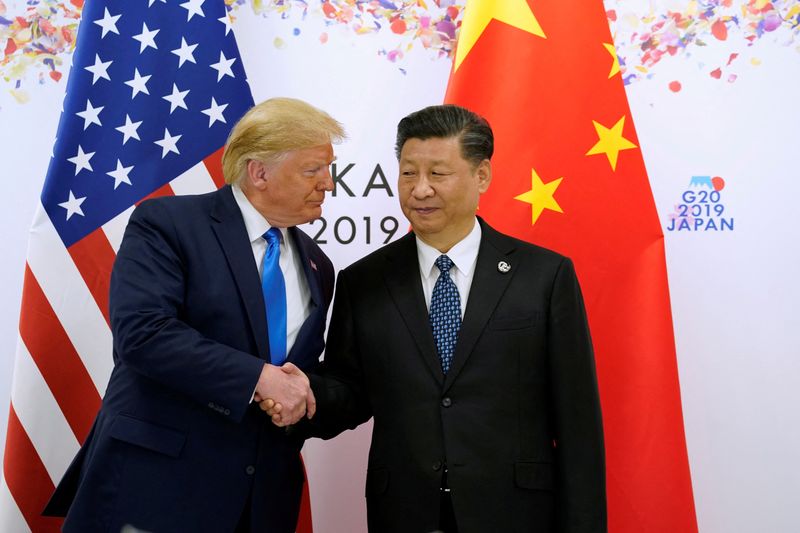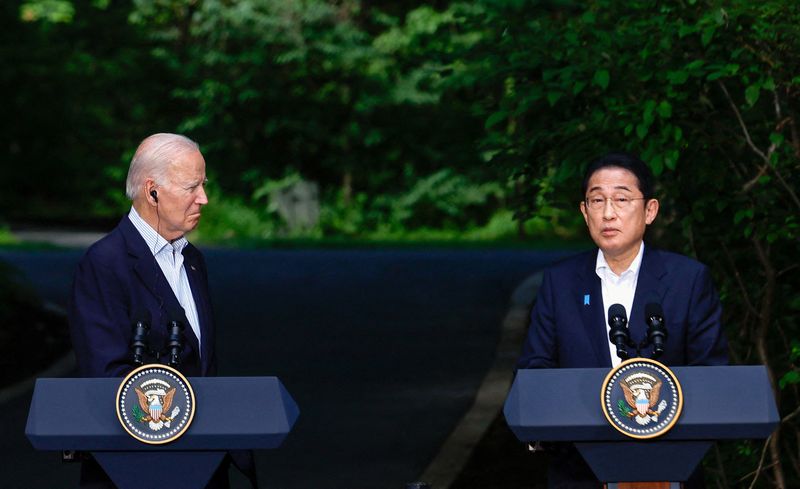By John Geddie, Tim Kelly and Yoshifumi Takemoto
TOKYO (Reuters) - Japan, America's closest ally in Asia, has been trying to send a message to U.S. presidential hopeful Donald Trump: don't try to strike any deal with China that could upend years of collective efforts to rein in Beijing and risk the region's fragile peace.
Tokyo has stepped up attempts to engage with people close to Trump in recent weeks, as the 77-year-old's victories in Republican primaries in Iowa and New Hampshire have seen him emerge in some polls as the frontrunner in November's presidential election.
The outreach - detailed in interviews with six Japanese officials, much of it previously unreported - comes as Prime Minister Fumio Kishida prepares for an April state visit to the U.S. at President Joe Biden's invitation.
Japan's endeavours have included dispatching a senior ruling-party figure to try to meet Trump, and engagement by Japanese diplomats with think tanks and former U.S. officials aligned with Trump, three of the officials said.
Top of Tokyo's worry list is that if Trump returns to power he may seek some kind of trade or security deal between the world's top two economies that could undermine recent efforts by the Group of Seven (G7) wealthy nations to counter China, according to the six officials, who spoke on the condition of anonymity because of the issue's sensitivity.
Trump, who reached a trade agreement with Beijing in 2019 that later expired, has not mentioned any potential deal with China during his campaign for the 2024 nomination.
The Japanese officials said they had no specific knowledge of Trump's plans, but they based their concerns on his public comments and actions during his 2017-2021 term, in which he eschewed some multilateral cooperation, defended his relationships with authoritarian leaders such as China's Xi Jinping, and unsuccessfully sought a nuclear deal with North Korean leader Kim Jong Un.
Two Japanese foreign ministry officials said they fear that Trump may be prepared to weaken U.S. support for nearby Taiwan in pursuit of a deal with China. They said such a move could embolden Beijing, which claims Taiwan and has not ruled out seizing the island by force.
A Trump aide told Reuters that no recent meetings have taken place between Trump and Japanese officials. They would not comment further.
Asked in an interview with Fox News in July 2023 whether the U.S. should help defend Taiwan if it means going to war with China, Trump said: "If I answer that question, it will put me in a very bad negotiating position. With that being said, Taiwan did take all of our chip business. We used to make our own chips. Now they're made in Taiwan."
Tokyo also worries that Trump may again hit Japan with protectionist trade measures such as tariffs on steel, and revive demands for it to pay more toward the cost of stationing U.S. forces in the country, according to the six Japanese officials.
Japan's outreach is part of a pre-emptive approach to understand whether these issues would likely resurface, and to convey Tokyo's positions, two of the officials said. Trump said this week that, if elected, he would block the planned $14.9 billion acquisition of U.S. Steel by Japan's Nippon Steel.
In a statement, Japan's foreign ministry said it was "watching the U.S. presidential election with great interest", while noting bipartisan U.S. commitment to the U.S.-Japan alliance.
Ado Machida, a Tokyo-based businessman who served in Trump's transition team after his 2016 election victory, said Japanese officials were eager to connect with his former boss.
"If he is going to cut a deal with China, Japan needs to try and get ahead of the curve and understand its potential role to support its interests in both the U.S. and in China," said Machida.
The Chinese and Taiwanese foreign ministries both said they would work closely with the U.S. regardless of the election outcome.
Late Japanese prime minister Shinzo Abe was the first foreign leader to meet Trump after his 2016 victory. The pair went on to form a close relationship, forged over hours on the golf course, that helped defuse several contentious issues.
REACHING OUT
Taro Aso, a leading figure in Japan's ruling Liberal Democratic Party (LDP) who was deputy prime minister during Trump's term, travelled to the U.S. last month to try to meet Trump, though he was not able to see him, according to three of the six officials. Aso's office declined to comment.
Japan's new U.S. ambassador, Shigeo Yamada, was appointed late last year with specific instructions to connect with the Trump campaign, according to two of the officials. Japan's embassy in Washington, on behalf of the ambassador, declined to comment on matters related to the U.S. election.
Complicating matters for Tokyo is that many of Trump's former cabinet members that were focused on Japan - such as Mike Pence, Jim Mattis and Mike Pompeo - are no longer seen as close to him, said Michael Green, a former U.S. official who heads the U.S. Studies Centre at the University of Sydney.
Senator Bill Hagerty, Trump's former envoy to Japan who some analysts say could play a prominent role in a second Trump administration, met with several Japanese officials during a visit to Tokyo at the turn of the year.
He also sat alongside Aso and Yamada at an event hosted by Japan's U.S. embassy during Aso's trip to the U.S., according to photos the embassy posted on social media.
Hagerty told Reuters that Japanese interlocutors "know Trump and know he is someone who means business" in the region, adding that Japan's main concerns - Chinese and North Korean aggression - looked like they did in 2016.
Robert O'Brien, Trump's former national security adviser, also has connections with Japanese officials, two of the sources said. O'Brien, whose American Global Strategies consultancy counts Japan's former national security adviser Shigeru Kitamura among its ranks, did not respond to requests for comment.
'RISKY SEAS'
Tokyo is particularly concerned that Trump's return could create volatility with China. When engaging with people Japan views as close to Trump, it has been emphasising the benefits of a multilateral approach on China policy, two of the Japanese officials said, such as the G7's agreement last year to counter economic coercion and de-risk critical supply chains.
While Biden has repeatedly said the U.S. would defend Taiwan in the event of a Chinese invasion - though the White House later walked back his comments - Trump has been less clear about his position.
"We don't want risky seas for misunderstanding," said Tsuneo Watanabe, a senior fellow with Tokyo-based policy research organisation Sasakawa Peace Foundation, who said he was aware of Japan's attempts to reach out to Trump.
In a foreword to a new edition of his memoir released this week, former U.S. national security adviser John Bolton wrote that if re-elected, Trump could embolden China to blockade Taiwan.
One challenge for Japan is determining who will try to placate Trump if he returns to office.
Officials and analysts say Kishida, whose ratings have plunged over several party scandals, may not be in charge when the Nov. 5 U.S. presidential election comes around. The LDP must hold a leadership vote by the end of September.

"Clearly Trump is one factor" in the LDP's choice of leader, said Watanabe, adding that the party will ideally look for a candidate who can speak English, build rapport with Trump and play golf.
"A good golfer is bad. Just needs to be a nice golfer so as not to beat Trump," he said.
